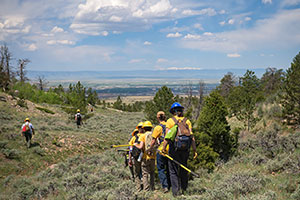
Contact Us
Institutional Communications
Bureau of Mines Building, Room 137
Laramie, WY 82071
Phone: (307) 766-2929
Email: cbaldwin@uwyo.edu
UW to Launch New Masters Degree in Environment, Natural Resources and Society
Published June 30, 2021

Members of the Wyoming Conservation Corps at UW work on trail construction at the
new Pilot Hill recreation area east of Laramie. A new UW master’s degree program in
environment, natural resources and society offers the opportunity to participate in
community efforts such as the Pilot Hill Project. (UW Photo)
A new master’s degree program that prepares students to become collaborative, interdisciplinary leaders in environmental and natural resource fields will launch this fall, following action by the University of Wyoming Board of Trustees.
The board voted at its May meeting to approve the new Master of Science degree in environment, natural resources and society (ENRS), a program in UW’s Haub School of Environment and Natural Resources.
“National research and our own student, alumni and employer surveys clearly show that employers in environmental fields seek to hire employees with interdisciplinary experience and essential skills in leadership, communication, teamwork, critical thinking, problem-solving and collaboration,” says Steve Smutko, Spicer Chair in Collaborative Practice and Haub School associate dean. “We interviewed leaders of government, nonprofit and academic programs. Their top recommendations were to provide students with essential skills in communication, applying knowledge in the real world and how to operate outside of academia. All of these recommendations are central components of the ENRS degree.”
UW is now accepting applications to the program. Students may apply to one of three ENRS tracks depending on their career aspirations and research interests. The individual research track emphasizes a program of study that culminates in a written thesis, directed by a Haub School faculty member who serves as the student’s adviser. The team-based research track is coordinated around a group project with three to five students, each centered on his or her own disciplinary focus. For example, a student interested in wildlife management may team up with students studying social science and recreation management to work on a project studying the impacts of outdoor recreation on sensitive wildlife in a national park. The third track, currently in development, focuses on coursework toward the completion of a certificate or minor in such areas of concentration as natural resource policy, collaborative decision-making or science communication.
An important learning outcome of the ENRS degree is to experience critical engagement with community stakeholders and decision-makers. Each student will take three credits of applied practicum over the course of his or her graduate program. Through the practicum, students can engage directly with communities by attending public meetings, interviewing stakeholders, participating in collaborative projects or other means. Students will work with Haub School faculty to coordinate their practicum experiences.
“We currently have strong and numerous partnerships with communities and stakeholders that provide the foundation for developing research projects and educational experiences that arise directly from the needs of our partner communities in Wyoming and beyond,” Smutko says. “Our partners and constituencies are increasingly requesting our faculty to conduct applied research around pressing environmental and natural resources issues. ENRS students will significantly increase our capacity to do this.”
The dynamic and rapidly changing environmental and natural resource fields demand that professionals have an integrated understanding across a broad array of disciplines, with one or more areas of significant specialization. Graduates of the ENRS program will be prepared to enter fields such as natural resource management, planning and administration across sectors including nonprofit, for profit, government and education.
For over 25 years, UW’s Haub School of Environment and Natural Resources has been educating future leaders to take on environment and natural resource challenges and create sustainable futures. The new degree program is built on the interdisciplinary model of the Haub School’s undergraduate and graduate degrees. The school currently offers a dual Juris Doctor/Master of Arts in environment and natural resources that requires concurrent matriculation in the College of Law. The school also offers a concurrent graduate major in environment and natural resources that may be added to a master’s degree in another program. Both of these programs are strongly interdisciplinary and require elective courses from across campus to fit the student’s program of study. ENRS will follow this coursework model.
For more information about and to apply for the new ENRS program, go to www.uwyo.edu/haub/academics/graduate-students/enrs.html.
Contact Us
Institutional Communications
Bureau of Mines Building, Room 137
Laramie, WY 82071
Phone: (307) 766-2929
Email: cbaldwin@uwyo.edu
